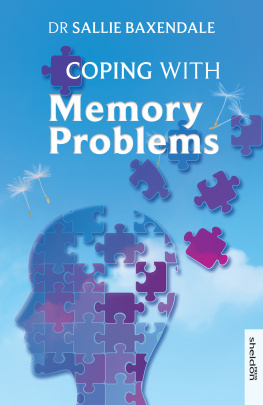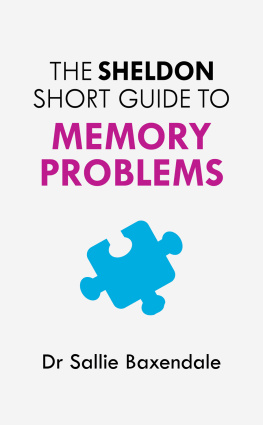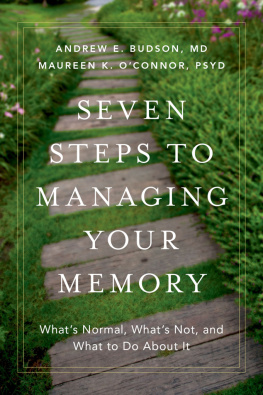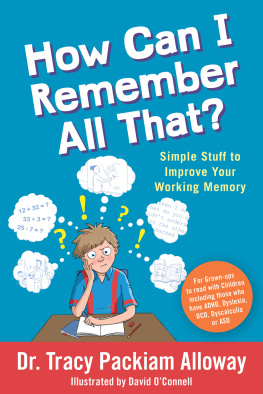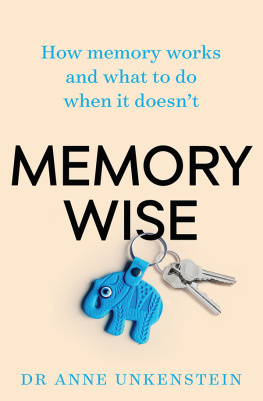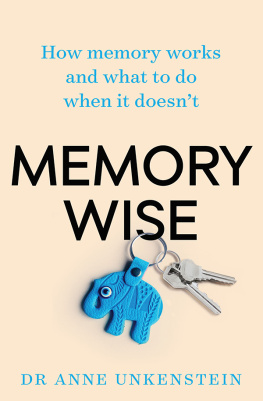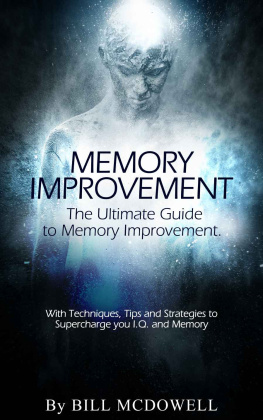Coping with Memory Problems
Dr Sallie Baxendale is a consultant clinical neuropsychologist who has worked with people with memory difficulties in the NHS for over twenty years. She is the author of over fifty academic publications on memory function. Her work in this field ranges from the development of rehabilitation strategies to studies of the ways in which memory problems are misrepresented in the media. She currently works for the Institute of Neurology, University College London.
Overcoming Common Problems Series
Selected titles
The A to Z of Eating Disorders
Emma Woolf
Autism and Asperger Syndrome in Adults
Dr Luke Beardon
Chronic Pain the Drug-free Way
Phil Sizer
Coping with Aggressive Behaviour
Dr Jane McGregor
Coping with Diverticulitis
Peter Cartwright
Coping with Headaches and Migraine
Alison Frith
Coping with the Psychological Effects of
Illness
Dr Fran Smith, Dr Carina Eriksen
and Professor Robert Bor
Dementia Care: A guide
Christina Macdonald
Depression and Anxiety the Drug-free Way
Mark Greener
Depressive Illness: The curse of the strong
Dr Tim Cantopher
Dr Dawns Guide to Sexual Health
Dr Dawn Harper
Dr Dawns Guide to Toddler Health
Dr Dawn Harper
Dr Dawns Guide to Your Babys First Year
Dr Dawn Harper
Dying for a Drink: All you need to know
to beat the booze
Dr Tim Cantopher
The Empathy Trap: Understanding antisocial
personalities
Dr Jane McGregor and Tim McGregor
Everything Your GP Doesnt Have Time to Tell
You about Alzheimers
Dr Matt Piccaver
Everything Your GP Doesnt Have Time to Tell
You about Arthritis
Dr Matt Piccaver
Gestational Diabetes: Your survival guide
to diabetes in pregnancy
Dr Paul Grant
The Heart Attack Survival Guide
Mark Greener
The Holistic Guide for Cancer Survivors
Mark Greener
Hope and Healing after Stillbirth
and Early Baby Loss
Professor Kevin Gournay and Dr Brenda Ashcroft
How to Stop Worrying
Dr Frank Tallis
IBS: Dietary advice to calm your gut
Alex Gazzola and Julie Thompson
Living with Angina
Dr Tom Smith
Living with Multiple Sclerosis
Mark Greener
Living with Tinnitus and Hyperacusis
Dr Laurence McKenna, Dr David Baguley
and Dr Don McFerran
Mental Health in Children and Young People:
Spotting symptoms and seeking help early
Dr Sarah Vohra
The Multiple Sclerosis Diet Book
Tessa Buckley
Parenting Your Disabled Child:
The first three years
Margaret Barrett
Sleep Better: The science and the myths
Professor Graham Law and Dr Shane Pascoe
Stress-related Illness
Dr Tim Cantopher
Taming the Beast Within: Understanding
personality disorder
Professor Peter Tyrer
Therapy Pets: A guide
Jill Eckersley
Toxic People: Dealing with dysfunctional
relationships
Dr Tim Cantopher
Treating Arthritis: The drug-free way
Margaret Hills and Christine Horner
Treating Arthritis Diet Book
Margaret Hills
Understanding Hoarding
Jo Cooke
Vertigo and Dizziness
Jaydip Ray
Wellbeing: Body confidence, health and happiness
Emma Woolf
Your Guide for the Cancer Journey:
Cancer and its treatment
Mark Greener
Lists of titles in the Mindful Way and Sheldon Short Guides series are also available from Sheldon Press.
Overcoming Common Problems
Coping with Memory Problems
DR SALLIE BAXENDALE

First published in Great Britain in 2014 by Sheldon Press
An Hachette UK Company
Sheldon Press
Carmelite House
50 Victoria Embankment
London EC4Y 0DZ
www.sheldonpress.co.uk
Copyright Dr Sallie Baxendale 2014
All rights reserved. No part of this book may be reproduced or transmitted in any form or by any means, electronic or mechanical, including photocopying, recording, or by any information storage and retrieval system, without permission in writing from the publisher.
The author and publisher have made every effort to ensure that the external website and email addresses included in this book are correct and up to date at the time of going to press. The author and publisher are not responsible for the content, quality or continuing accessibility of the sites.
British Library Cataloguing-in-Publication Data
A catalogue record for this book is available from the British Library
ISBN 9781847092755
For Jane, the best of friends and the very best memories
Contents
Youd forget your head if it wasnt screwed on.
Ive got the memory of a goldfish.
My memorys a sieve.
Memory lapses are such a part of everyday life that the English language is peppered with clichs to describe them. They are almost as much a feature of British conversation as the weather. When people share their embarrassing anecdotes about a failure to recognize a work colleague in the street, or describe the convoluted steps they had to take to avoid using the elusive name of an acquaintance in a chance encounter, they are almost always met with the reply, Oh I know... The same thing happened to me this morning/yesterday/last week. And so these tales of memory difficulties appear to be universal and, perhaps, nothing to worry about. But for some people, these memory lapses happen too often and the resulting consequences are too problematic and embarrassing for them to just be dismissed as part of everyday life.
Confiding in close friends can often make us feel better about our problems. Even if there arent any practical solutions to be had, we can usually derive a great deal of comfort from the feeling that somebody understands and empathizes with our situation. But when people try to express their concerns about memory problems, the frequent response of Oh that happens to me all the time can leave them feeling even more isolated and anxious than before. You may suspect that your memory lapses are out of the ordinary, but getting other people to understand the worrisome extent of the problem can be very difficult indeed. When you are left to your own devices, all kinds of terrifying thoughts may run through your mind as to why your memory might be going downhill, with the frightening spectre of dementia often hovering on the horizon. Some people may find that they slowly withdraw from friends and family members as they lose confidence in their ability to remember and discuss past events, further increasing their isolation. The resulting anxiety, low mood and depression this generates often exacerbates the original memory difficulties and so a downward spiral of deterioration begins.
If you are struggling with memory problems yourself or are caring for someone who has memory difficulties, this book has been written to help you cope. It is divided into two sections. The first half of the book explains how memory works. Once you understand how something works, its easier to see where and why the process may be breaking down and, if it is broken, how it might be fixed. Although people will often use the blanket phrase my memory is terrible the brain uses many different mechanisms to store and retrieve information and, even in people with far-reaching memory difficulties, not all systems are affected to the same extent. Each chapter in the first part of this book describes a different aspect of memory. examines the ways we retrieve information from our long-term memory store and looks at some of the things that can get in the way and block this process. Its a lot to do with the way that the information was stored in the first place. This chapter also examines one of the most frustrating and ubiquitous memory complaints we hear in the memory clinic: word-finding difficulties or the tip of the tongue phenomenon.

